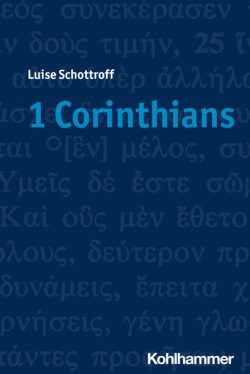Читать книгу 1 Corinthians - Luise Schottroff - Страница 6
На сайте Литреса книга снята с продажи.
Foreword to the Second Edition
ОглавлениеThe commentary by Luise Schottroff to The First Letter to the Congregation in Corinth appeared in 2013. Therein she offered an easily understandable, true-to-life interpretation of this letter, which directs attention to the living conditions of the Corinthian congregation, offers a political analysis of the power structures underlying the Roman Empire and reveals the daily struggle for dignity of the people in the messianic communities. This second edition offers in extensive sections the unaltered text of the first. The bibliography was enlarged with current publications—in keeping with the wishes of Luise Schottroff, whose concern was never completeness but relevance for a socio-historical, imperium-critical and gender-conscious rereading of Paul’s writings in the context of ancient Judaism. Minor mistakes in the manuscript were corrected and a few additions were made. Her interpretation continues to be up-to-date and represents the present state of international Pauline research. Even after her death, Luise Schottroff is an important teacher for those who are seeking their own critical and life-serving access to theology and exegesis.
In 2013, on the occasion of the publication of the commentary, Luise Schottroff received the Leonore Siegele-Wenschkewitz-Prize of the Protestant Church in Hessen and Nassau (EKHN) for her lifework. For this becomes clear: She puts to work in her interpretation of The First Letter to the Congregation in Corinth the yield of her more than forty-year research on Paul. The guidelines of the Theologischer Kommentar zum Neuen Testament [ThKNT] series, of which she is coeditor, are also the central themes of her own exegetical work since the late 1970s: social history, Christian-Jewish dialogue and feminist theology. Her works were and still are trailblazing for a comprehensive rereading of Paul’s letters in the German speaking realm and also internationally. The appearance of the second edition of her commentary should, therefore, be taken as the occasion for a comprehensive honoring of her exegetical work in this field of research.
